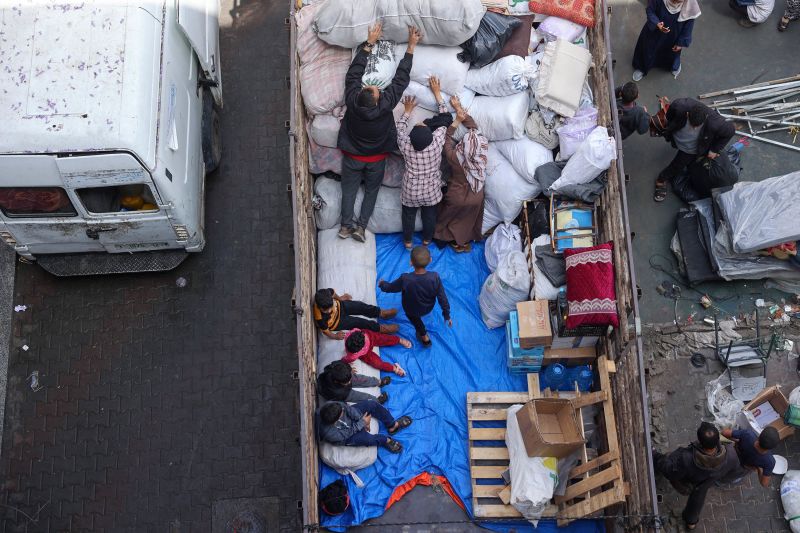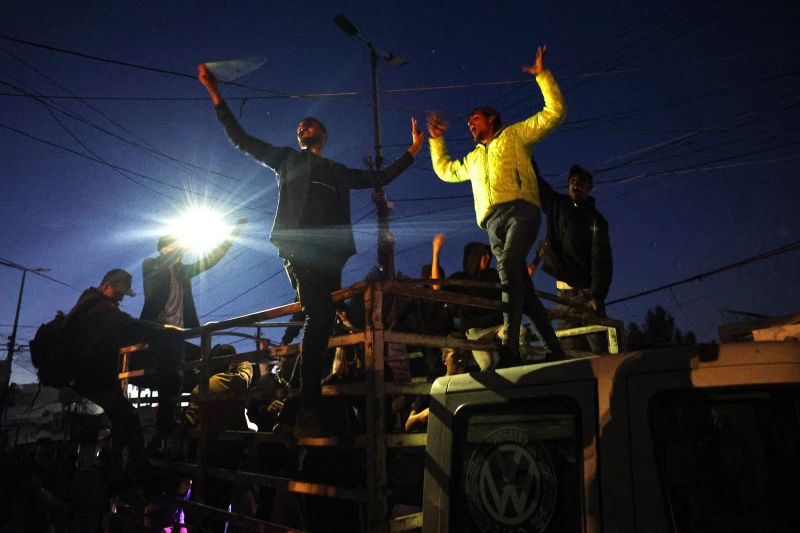
Israel Continues Rafah Operations as Hamas' Demands Remain Unmet

Israel expresses dissatisfaction with the ceasefire terms accepted by Hamas, stating that the demands are still far from being met. Despite sending negotiators to mediators, Israel vows to persist with military operations in Rafah.
Israel expressed that the ceasefire proposal accepted by Hamas on Monday does not meet their demands. Despite this, Israel stated that military operations in Rafah will continue. At the same time, negotiators were sent to speak with mediators.
Hamas announced on Monday that its political bureau leader, Ismail Haniyeh, informed the Qatari prime minister and Egyptian intelligence minister about the acceptance of their ceasefire and hostage deal proposals.
Palestinians rejoiced in the streets of Gaza over the statement, while in Tel Aviv, families of hostages and their supporters urged Israel’s leaders to agree to the deal. However, Israel quickly stated that the terms accepted by Hamas were still not satisfactory, emphasizing their commitment to an offensive in Rafah. The war cabinet unanimously decided to proceed with the operation to put military pressure on Hamas. Nonetheless, they agreed to send a delegation for further discussions with the mediators.
Later on Monday evening, the Israel Defense Forces announced that they were carrying out targeted strikes on Hamas terror targets in eastern Rafah in the southern Gaza Strip. Videos and images captured by CNN displayed several explosions in the Rafah area on Monday night.
CNN political and global affairs analyst Barak Ravid reported that Israeli forces were planning to seize control of the Palestinian side of the Rafah crossing within the next few hours, based on information from two sources with direct knowledge.
Just hours after Israel ordered Palestinians in Rafah, a city in southern Gaza, to evacuate, news came that raised concerns of an impending assault on the city. It is feared that Israel's long-threatened attack on Rafah may be approaching. Over 1 million Palestinians have sought refuge in Rafah, where Hamas is thought to have regathered following Israel's destruction of parts of northern Gaza.
A source familiar with Israeli plans shared with CNN that a limited incursion into Rafah was planned to maintain pressure on Hamas to agree to a ceasefire and release hostages.
US officials informed CNN that they are closely watching reports of explosions in Rafah and have serious concerns about the developing situation. However, they do not believe that the current events signify the start of a significant Israeli military operation in southern Gaza.
The Biden administration remains opposed to Israel going into Rafah, White House spokesman John Kirby told reporters.
No agreement
Ceasefire discussions are set to carry on Tuesday, according to a statement by Dr. Majed bin Mohammed Al-Ansari, spokesperson for the Qatari Ministry of Foreign Affairs.
The Qatari team will travel to Cairo in the morning to resume talks between Israel and Hamas through mediators. Hamas has responded to the ceasefire proposal in a positive manner, leading to further negotiations.
The Qatari announcement coincides with global appeals for a ceasefire and the release of hostages. UN Secretary-General Antonio Guterres urged both the Israeli government and Hamas to come to an agreement following Hamas' announcement.
According to a senior Israeli and US official, Hamas has agreed to a different framework proposal than the one crafted with Egypt by Israel. The new proposal includes a ceasefire, something Israeli Prime Minister Benjamin Netanyahu has previously rejected, as stated by the senior American official.
Hamas stated in a press release that they are standing firm on their demands in the latest proposal. These demands include a ceasefire, complete withdrawal, dignified exchange, reconstruction, and lifting of the blockade.
Benny Gantz, a member of Israel's war cabinet, mentioned on Monday that there are "significant gaps" between Israel and Hamas. However, he also noted that efforts are ongoing as a delegation is set to go to Cairo for further discussions.
The proposed agreement, which Hamas has agreed to, was mediated by Qatar and Egypt. It involves the release of 33 Israeli hostages and hundreds of Palestinian prisoners over a period of 42 days. The agreement also includes the rebuilding of Gaza during a time of sustainable peace, as per a document shared with CNN by a source familiar with the negotiations in the region.
The framework of the agreement outlines that it will be carried out in three phases, each lasting 42 days. Additionally, there will be a complete withdrawal of Israeli forces from Gaza during the second phase, as stated in the document and confirmed by Hamas senior official Khalil Al-Hayya in an interview with Al Jazeera.
Palestinians in Rafah pack belongings into a truck after Israel's evacuation order, May 6, 2024.
Palestinians in Rafah pack belongings into a truck after Israel's evacuation order, May 6, 2024.
AFP/Getty Images
Related article
Gazans in eastern Rafah are beginning to evacuate following orders from the Israeli military. The White House stated on Monday that Hamas has responded to a proposed hostage deal in Israel. President Joe Biden has been briefed on the response, but did not comment on the details of the potential deal.
White House national security spokesman John Kirby mentioned at a press briefing that President Biden is fully informed about the current situation and the ongoing process. Additionally, CIA Director Bill Burns is actively present in the region, working on the ground in real time.
Kirby emphasized the importance of reaching an agreement, stating that it is the best possible outcome for both the hostages and the Palestinian people. He reassured that efforts will continue towards achieving this goal.
Palestinians in Rafah celebrate news that Hamas has accepted a ceasefire proposal, May 6, 2024.
Palestinians in Rafah celebrate news that Hamas has accepted a ceasefire proposal, May 6, 2024.
AFP/Getty Images
IDF operations ongoing
Israel Defense Forces (IDF) spokesperson Daniel Hagari stated that despite Hamas’ acceptance of a deal, the military will still be active in Gaza. He mentioned that operations are ongoing, but efforts are being made in negotiations to bring the hostages back home quickly.
Prime Minister Netanyahu has faced strong opposition from the more radical members of his coalition regarding the ceasefire proposal from last week. They are urging him to concentrate on eliminating Hamas in Rafah instead.
Orit Strook, Israel's settlements minister and a member of the far-right Religious Zionism party, expressed concerns about accepting the deal. She mentioned that it could jeopardize Israel's military progress.
Itamar Ben Gvir, Israel's national security minister, criticized Netanyahu for making promises that he believes could have negative consequences. Ben Gvir mentioned that Netanyahu assured that the war would not end and pledged that there would be no reckless deal.
Large portions of the Israeli population have been calling for Netanyahu to agree to a deal. Last week, families and supporters of the hostages took to the Ayalon Highway in Tel Aviv, displaying a banner that said: “Rafah or the hostages – choose life.”
Benny Gantz, a member of Israel’s war cabinet and a potential successor to Netanyahu, emphasized that the return of the hostages should take precedence over entering Rafah.
The Hostages Families Forum responded to Hamas's announcement on Monday, stating that it is important for everyone involved to follow through on their commitments and work towards a deal for the release of all the hostages.
This story is still developing, and we will provide updates as more information becomes available.
CNN’s Michael Williams, Oren Liebermann, Jennifer Hansler, and Lauren Izso contributed reporting.
Editor's P/S:
The ongoing conflict in Gaza remains a complex and heart-wrenching situation. While Hamas has accepted a ceasefire proposal, Israel's continued military operations in Rafah raise concerns about the potential for further escalation. The fact that Hamas has agreed to a ceasefire but Israel deems it unsatisfactory highlights the significant gaps between the two sides. The ongoing negotiations and diplomatic efforts are crucial in finding a path towards a lasting resolution.
The international community has expressed grave concerns about the potential for a large-scale military operation in Rafah. The United States, in particular, has voiced its opposition to Israel's plans. The humanitarian crisis in Gaza, where over a million Palestinians have sought refuge, also weighs heavily on the international community's concerns. It is imperative that all parties involved prioritize the safety and well-being of civilians and work towards a peaceful settlement.














